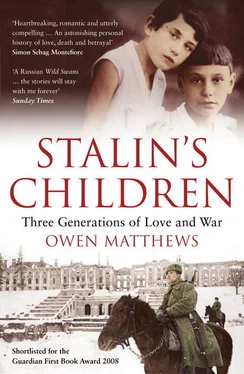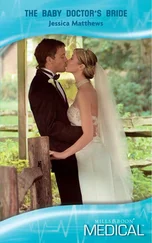It was only towards the end of my time in Moscow, after I had worked out much of my aggression at the world in general, that I bothered to begin to try to understand my father, whose life my own had unwittingly followed so closely. After refusing to believe that my parents’ lives had anything to do with mine, I finally acknowledged that the time had come to record those moments when Russia reached into me, as it had into my father. Both of us had found something of ourselves here and that realization brought me a feeling of fellowship with the old man. The feeling was soundless, but it crackled.
My father has spent much of his old age retreating into himself, working hard to cocoon himself behind walls of solitude. It is odd that while my parents were kept apart by politics, by a seemingly unbridgeable ideological divide, some force of will, of magnetism, drew them together and gave them hope and courage through six years of separation. But now, half a lifetime later, the defining momentum of my family is a centrifugal force which has thrown us physically apart. My father spends much of his time these days in the Far East, far from anyone who knows him, travelling in Nepal and China and Thailand, pottering on beaches, living in rented rooms, reading and writing. At home in London, my parents have reached a kind of truce – founded, perhaps, on a realization that suddenly life has passed and the running series of domestic skirmishes they fought with each other could have no victor.
* * *
My father and I reached a kind of reconciliation, feeling our way towards each other, after I married Xenia. We moved to Istanbul, where my sons Nikita and Theodore were born, but would come back to spend every winter at Xenia’s family dacha. My father came and stayed at my in-laws’ rambling apartment in the backstreets off the Arbat, just round the corner from Starokonushenny Pereulok. He spent his time wandering around bookshops, amazed that the Dom Knigi on the New Arbat was filled with so much literature, and he could pay with his English credit card. On the street were advertisements for the Russian edition of GQ (the latest edition even carrying a flattering profile of his own war correspondent son) and a booth selling mobile phones.
In the last days of 2002 we drove out to the dacha. There was a hard frost, and the tall pines of Nikolina Gora stood stark against a baby-blue winter sky. In the distance, a line of trees was crisply outlined, deep black against the snowfields. The air was so cold it burned the lungs.
My father and I went for a walk on the frozen Moscow River. I lent him the heavy old overcoat he’d bought in Oxford in the fifties, and I wore a shaggy sheepskin Soviet Army coat. My father was getting visibly elderly, his hip was giving him trouble and he limped and stumbled in the snowdrifts of the riverbank. It was so cold that the thick snow overlying the river’s ice creaked like floorboards under our boots.
‘No great shakes, really,’ said my father, of his life. ‘No great shakes. When I realized I wasn’t getting back into Oxford I gave up. When I look at my achievements, they’re quite modest. Quite modest.’
There was a long silence, the low moan of wind blowing the snow into eddies.
‘But you won. You got mother out of Russia. That was a huge achievement, no?’
He gave a dismissive nod, and a sigh. ‘I thought I would be deliriously happy when I got her out, but I wasn’t. The problems started almost immediately, all kinds of tensions. I thought I’d give it a few months, to see if things got better, and they did, to a certain extent. So I just let things drift, really.’
‘So did you ever think of giving up?’
‘No. I never once thought of it. I’d made up my mind and given her my word, and that was that. Though I never imagined it would go on for so long. After five years we were still at square one. If she’d broken it off I think I would have got over it fairly quickly. There was this Erik… I never knew if anything was going on there, but I thought she might end up with him if things didn’t work out.’
He spoke as if it was not himself he was describing but someone he knew – detached, without pain but with a tinge of professional regret, like a surgeon probing an infirm patient.
‘I was very moved when she told me about what she’d been through, her childhood, the war. Terrible really. It struck me very deeply. She’d had such a miserable life I wanted to give her a decent deal. That was an important part of it. And then there was the physical disability.’
In the distance a snowmobile roared into view, and my father winced as we stood aside and it passed in a cloud of exhaust. Through the trees on the high riverbank we could see the pitched roofs of the dachas of Russia’s new super-rich, Xenia’s new neighbours, built on plots of land worth millions. The old dacha of Andrei Vyshinsky, the Prosecutor-General who had signed my grandfather’s death warrant, had been rebuilt as a faux French chateau. A new world.
‘Who would have thought that things would change so fast. I never, ever imagined that it would happen in my lifetime.’
That evening, in the kitchen of the dacha, my father stirred his tea with the same old perforated spoon which has accompanied him on his travels like a talisman. We had a minor row about my sister, and he stalked upstairs, waving me off with his teacup. Half an hour later he came back, we changed the subject, and spoke some more. As he stood to leave to retire to bed he stopped abruptly and hugged me as I sat at the kitchen table, and kissed me lightly on the head.
One final image. My mother, on the terrace of our garden in Istanbul, with four-year-old Nikita. She is seventy-two years old, and her hip is giving her trouble, and she walks with a stick. But as I watch from my study window, I see that the stick is discarded, and she is cutting off a piece of old rope with a pair of scissors. As Kit looks on in delight, she starts to skip, slower, faster, crossing the rope in front of herself as she counts off skipping rhymes she learned in the playground at Verkhne-Dneprovsk. Kit is delighted, and starts chanting the rhymes himself, waving his arms in the air and running in circles in childish excitement. ‘One-two, one-twa-three, the rabbit peeks out from behind his tree,’ my mother chants, just as she had learned when she was Kit’s age and one of Stalin’s children. Like many Russian children’s rhymes, it’s wonderfully rhythmic, absurd, and violent.
Hunter takes aim with his gun,
Shoots the rabbit, bang-bang-bang,
Rush him to the hospital bed!
Seems our rabbit is quite dead.
Bring him home, three-four-five,
Look! Little rabbit is alive!
This book was an awfully long time in the making – in fact, fully half my adult life has passed since I first put down notes for a book I was going to call Moscow Babylon back in 1998. Luckily for everyone concerned, that book never appeared; instead, the project transformed over the years into the memoir it is today. lowe a vast debt of gratitude to all the friends and colleagues who put up with my writerly sufferings for all that time, and who helped me to realize that what I really should be writing about (and trying to understand) was not me, but Russia.
Most of my close friends have had the good fortune to read various bits of the manuscript over the last decade. Andrew Paulson, year after year, kept telling me that my writing was great, which was helpful even if probably in most cases untrue. Melik Kaylan flatteringly told me that he found the writing ‘surprisingly good’. Charlie Graeber, Andrew Meier, Michael FitzGerald, Mark Franchetti and Masha Lipman were kind enough to edit and comment at length on the whole thing, once it had more or less taken shape; their advice and friendship has been invaluable.
Читать дальше











